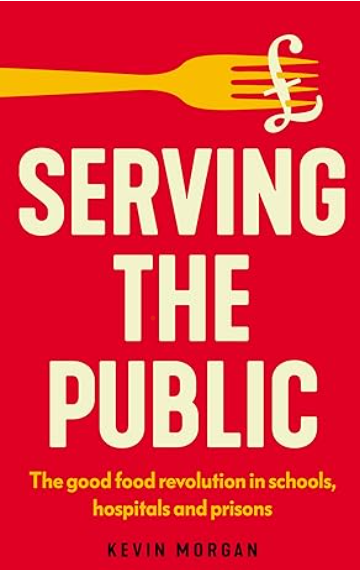Join Health Affairs for a virtual conversation between me and Angela Odoms-Young of Cornell University discussing the evolution of US food and nutrition policy, the current policy landscape, and thoughts on what lies ahead. It’s at 1:00 p.m. EDT. To join the Webinar, register here.
Weekend reading: Serving the Public
Kevin Morgan. Serving the public: The good food revolution in schools, hospitals and prisons. University of Manchester Press, 2025.

I did a blurb for this book:
In Serving the Public, Kevin Morgan describes the political, economic, and social causes of appallingly unhealthful and disrespectful institutional feeding programs in schools, hospitals and prisons, and the human and societal consequences of such programs, in both theory and practice. His book provides compelling examples and arguments for why and how we can–and must–do better.
Much of the book describes situations in the UK—Morgan is a professor at the University of Cardiff in Wales—but he also draws on U.S. examples (and cites my work). Here is why he thinks public nutrition matters.
But perhaps the main danger of personalised nutrition apps…is that they fuel the neoliberal belief that access to a healthy diet is a personal and private matter at a time when it is more imperative than ever to affirm the public duty of care that governments owe their citizens, especially poor and vulnerable citizens. Why is it more imperative than ever to affirm this public duty? Because the multiple crises of food insecurity, hunger and a host of diet-related diseases, to say nothing of the existential threats from climate change, are becoming more pronounced in the low-income countries of the Global South as well as in the high-income countries of the Global North.
And here’s another major point:
It is hard to exaggerate the significance of food in prisons. Our diet affects our physical, mental and emotional wellbeing whoever we are and wherever we live. But eating assumes even more importance for prisoners as they may be confined to a cell for twenty odd hours a day – even during mealtimes – and meals help to punctuate a day that otherwise consists of hours of mind-numbing tedium. Eating in prison is a unique experience because prisoners have limited capacity to choose what, where and when they eat, with the result that they lose control over key aspects of their health, their self-esteem and even their sense of identity.
I don’t usually think about these issues, remote as they are from my daily experience. It’s good to be reminded of the importance of institutional food and why we should do all we can to make it better.

